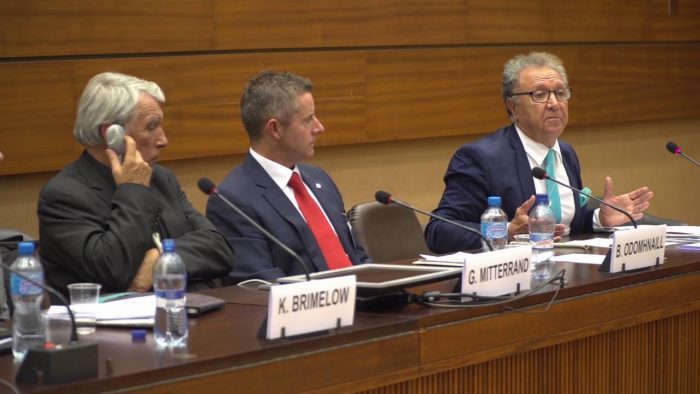
Perviz Khazai, speaking at a high level of experts panel, during a conference in the United Nation’s headquarter in Geneva, seeking international justice over Iranian regime’s 1988 massacre of 30,000 political prisoners, mainly MEK activists.
Mr. Gilbert Mitterrand (Left) President of the Foundation France Libertés – Danielle-Mitterrand Foundation since 2011, Irish Senator
Brian Ó Domhnaill (Middle) who served for the Agricultural Panel since August 2007, was also among the speakers at this conference-September 30, 2016
International law expert and former apprentice diplomat in the French Ministry of Foreign Affairs, Perviz S. Khazai, wrote an op-ed for news site Eurasia Review. Khazai charts the nature of EU-Iran relations in the wake of the US’s designation of the regime’s Revolutionary Guards (IRGC) as a foreign terrorist organization (FTO).
Khazai’s point of reference begins in 2010 when the Iranian regime and Europe butted heads over the Iranian nuclear program. This rift was smoothed over by the Joint Comprehensive Plan of Action (JCPO), the nuclear agreement signed in 2015.
“However, since agreeing to the 2015 deal, Iran has expanded its nuclear program,” Khazai writes, “despite warnings from the United States and European Countries.” This culminated in the early months of 2019, when the Iranian regime attempted to launch a satellite into orbit.
Europe is “Gravely Concerned”
The EU expressed its concern and has called on the Iranian regime to refrain from any further missile launches. The EU Council said in a statement, “these activities deepen mistrust and contribute to regional instability.”
Then, in February, the EU discussed re-imposing select sanctions on Iran. The discussion marked the first time Iranian sanctions had been brought to the table since 2015. The sanctions were limited. The EU only chose to sanction one deputy minister of the Iranian Ministry of Intelligence (MOIS) and two MOIS members. But they represented a cooling attitude towards the Iranian regime following several failed terror attacks on European soil.
The EU Is Resisting the US’s Economic Sanctions
Aside from its own limited sanctions, the EU has displayed a reluctance to follow the US down the road of economic sanctions. Following the re-imposition of US economic sanctions under US President Donald Trump, several European nations established INSTEX, a payment channel through which they could continue trading with the Iranian market and circumvent US sanctions.
But rifts in the regime leadership have hampered INSTEX’s methods. In March, the regime Supreme Leader issued a statement during a public speech that INSTEX was a “bitter joke” and reminded his followers that the EU cannot be trusted.
Although persevering with INSTEX to continue trading with Iran, several EU nations have sanctioned Iran’s Mahan Air. The airline is known to carry resources and equipment for the regime’s IRGC.
EU sanctions on the clerical regime are requisite to the fight on terrorism in Europe but they must be completed by blacklisting of the entire intelligence and IRGC apparatus and by prosecuting and expelling the regime's terrorist diplomats and mercenaries. #BlackListMOIS
— Maryam Rajavi (@Maryam_Rajavi) January 8, 2019
“Germany imposed its ban on Mahan in January, with the German foreign ministry saying this was necessary to protect Berlin’s ‘foreign and security policy interests,’” Khazai wrote.
Iranian Hackers Are Promoting Instability
Reports from Reuters in November found that the regime systematically targeted MEK members living in European countries through online misinformation channels. The Netherlands is also accusing the regime of being behind two assassinations of political dissidents on Dutch soil last year.
“Since the 1979 Iranian revolution, the Islamic revolutionary guard’s corps (IRGC) have been dedicated to export [sic] terrorism abroad. Despite the efforts of the EU and US during past years, Iran has never terminated its support for terrorist organizations especially in Syria, Lebanon, Yemen, and Iraq,” Khazai writes.
Recognize the right of the Iranian people to overthrow religious fascism and to achieve freedom#IStandWithMaryamRajavi #چهل_سال #MEK #Iran@siavoshhosseini pic.twitter.com/4nIEOVbbE0
— maddJavadi (@MaddJavadi) February 10, 2019
Khazai calls on the EU to support the US’s designation of the IRGC as a terror organization. “Europe should sit up and take notice that the protests and strike action ongoing across Iran since the end of 2017 by teachers, laborers, students, truck drivers and so many more [are] already a game changer,” he writes.
Khazai concluded,
“European governments and institutions would be wise at this point to discontinue their current dialogue with Tehran while they undertake a full and in-depth review of their approach toward Iran. Full transparency and accurate information made available to the public would be an essential requirement.”
Staff writer
